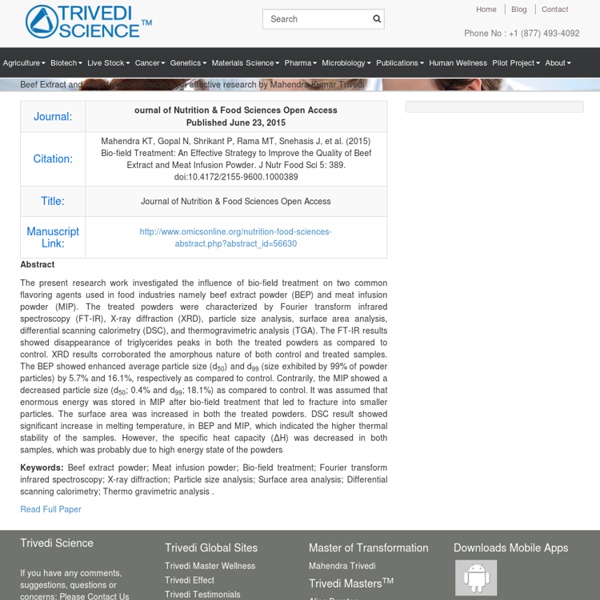



The Trivedi Effect Impact on Ceramic Oxide Nano Powders There Are Lots Of Exciting Things Happening Here At Trivedi Science. Enter Your Email Address In The Box Below Now To Stay Updated! The Trivedi Effect Impact on Ceramic Oxide Nano Powders Abstract Transition metal oxides (TMOs) have been known for their extraordinary electrical and magnetic properties. In the present study, some transition metal oxides (Zinc oxide, iron oxide and copper oxide) which are widely used in the fabrication of electronic devices were selected and subjected to biofield treatment.
Publication meta - Evaluation of Biofield Treatment Dose and Distance in a Model of Cancer Cell Death - Publications Objective: This study assessed the potential influence of biofield treatment on cultured human cancer cells and whether such influence was affected by varying the duration of the treatment (dose) or the distance between the biofield practitioner and the target cells. Design: Biofield treatment dosage was assessed from a short distance (0.25 meters) in three independent experiments involving 1, 2, or 5 treatments, along with another set of three independent and comparable mock experiments. Biofield treatment distance was assessed at 0.25, 25, and * 2000 meters involving two treatments in three independent experiments along with another set of three mock experiments. Intervention: Biofield treatments were delivered by a highly acclaimed biofield practitioner with the intention of diminishing growth of the cells or inducing cancer-cell death. Outcome measure: Cell viability was quantified 20 hours after treatments, using a spectrophotometric assay for live-cell counting.
Spectroscopic Characterization of Biofield Treated Metronidazole and Tinidazole There Are Lots Of Exciting Things Happening Here At Trivedi Science. Enter Your Email Address In The Box Below Now To Stay Updated! Trivedi Effect Impact on Metronidazole and Tinidazole Abstract
Evaluation of Phenotyping and Genotyping Characteristic of Shigella sonnei after Biofield Treatment Citation: Trivedi MK, Patil S, Shettigar H, Bairwa K, Jana S (2015) Evaluation of Phenotyping and Genotyping Characteristic of Shigella sonnei after Bioeld Treatment. J Biotechnol Biomater 5: 196. doi:10.4172/2155-952X.1000196 Page 2 of 5 Volume 5 • Issue 3 • 1000196 J Biotechnol Biomater
Biofield Treatment Impact on Spectral Properties of Antimony Sulfide There Are Lots Of Exciting Things Happening Here At Trivedi Science. Enter Your Email Address In The Box Below Now To Stay Updated! Biofield Treatment Impact on Spectral Properties of Antimony Sulfide Abstract Mahendra Trivedi biofield treatment on Pharmaceutical Compounds There Are Lots Of Exciting Things Happening Here At Trivedi Science. Enter Your Email Address In The Box Below Now To Stay Updated! Biofield | Mahendra Trivedi biofield treatment on Pharmaceutical Compounds Abstract Metronidazole and tinidazole are widely used antimicrobial drugs against Gram-negative and Gram-positive anaerobic bacteria. The present study was aimed to evaluate the impact of biofield treatment on metronidazole and tinidazole using FT-IR and UV spectroscopy.
Mahendra Trivedi Innovative Research on Improving Sensitivity Pattern Of Raoultella ornithinolytica There Are Lots Of Exciting Things Happening Here At Trivedi Science. Enter Your Email Address In The Box Below Now To Stay Updated! Mahendra Trivedi Innovative Research on Improving Sensitivity Pattern Of Raoultella ornithinolytica Trivedi Effect Impact on Structural Properties of CrO3 - Trivedi Science There Are Lots Of Exciting Things Happening Here At Trivedi Science. Enter Your Email Address In The Box Below Now To Stay Updated! Trivedi Effect Impact on Structural Properties of CrO3 Mahendra Trivedi Scientific Study on Antimicrobial sensitivity of MDR Stenotrophomonas maltophilia Abstract Stenotrophomonas maltophilia ( S. maltophilia ) is a Gram-negative bacillus, an opportunistic pathogen, particularly among nosocomial infections. Multi-drug resistant strains are associated with very high rate of morbidity and mortality in severely immunocompromised patients. Present study was designed to evaluate the effect of biofield treatment against multidrug resistant S. maltophilia .
Publication meta - Bio-field Treatment: A Potential Strategy for Modification of Physical and Thermal Properties of Gluten Hydrolysate and Ipomoea Macroelements - Publications The objective of present study was to study the effect of biofield treatment on physical and thermal properties of gluten hydrolysate (GH) and ipomoea macroelements (IM). The study was performed in two groups (control and treated). The control group remained as untreated, and biofield treatment was given to treated group. The control and treated GH and IM were characterized by particle size analysis, surface area analysis, X-ray diffraction (XRD), Differential scanning calorimetry (DSC), and Thermogravimetric analysis (TGA). Particle size results of treated GH showed that d 50 (average particle size) was decreased by 3.15% and d 99 (size exhibited by 99% of powder particles) by 18.40% as compared to control GH sample. The treated IM also showed substantial reduction in average particle size d 50 by 4.70% and d 99 by 44.40% as compared to control sample.
Bio-field Treatment: A Potential Strategy for Modification of Physical and Thermal Properties of Gluten Hydrolysate and Ipomoea Macroelements Share this: Embed* Cite this: Trivedi, Mahendra Kumar (2015): Bio-field Treatment: A Potential Strategy for Modification of Physical and Thermal Properties of Gluten Hydrolysate and Ipomoea Macroelements. figshare. The Trivedi Effect Impact on Chloramphenicol and Tetracycline There Are Lots Of Exciting Things Happening Here At Trivedi Science. Enter Your Email Address In The Box Below Now To Stay Updated! The Trivedi Effect Impact on Chloramphenicol and Tetracycline KeywordChloramphenicol; Tetracycline; Biofield treatment; Fourier transform infrared spectroscopy; Ultraviolet spectroscopy
Evaluation of Phenotyping and Genotyping Characteristic of Shigella sonnei after Biofield Treatment Abstract Shigella sonnei (S. sonnei) is a non-motile, rod shape, clinically significant, Gram-negative bacterium. It is commonly associated with dysentery (shigellosis). "Effect of Biofield Energy Treatment on Streptococcus group B: A Postpa" by Mahendra Kumar Trivedi Abstract Streptococcus agalactiae group B (S. agalactiae gr. B) is widespread in nature mainly causes bacterial septicemia and neonatal meningitis.